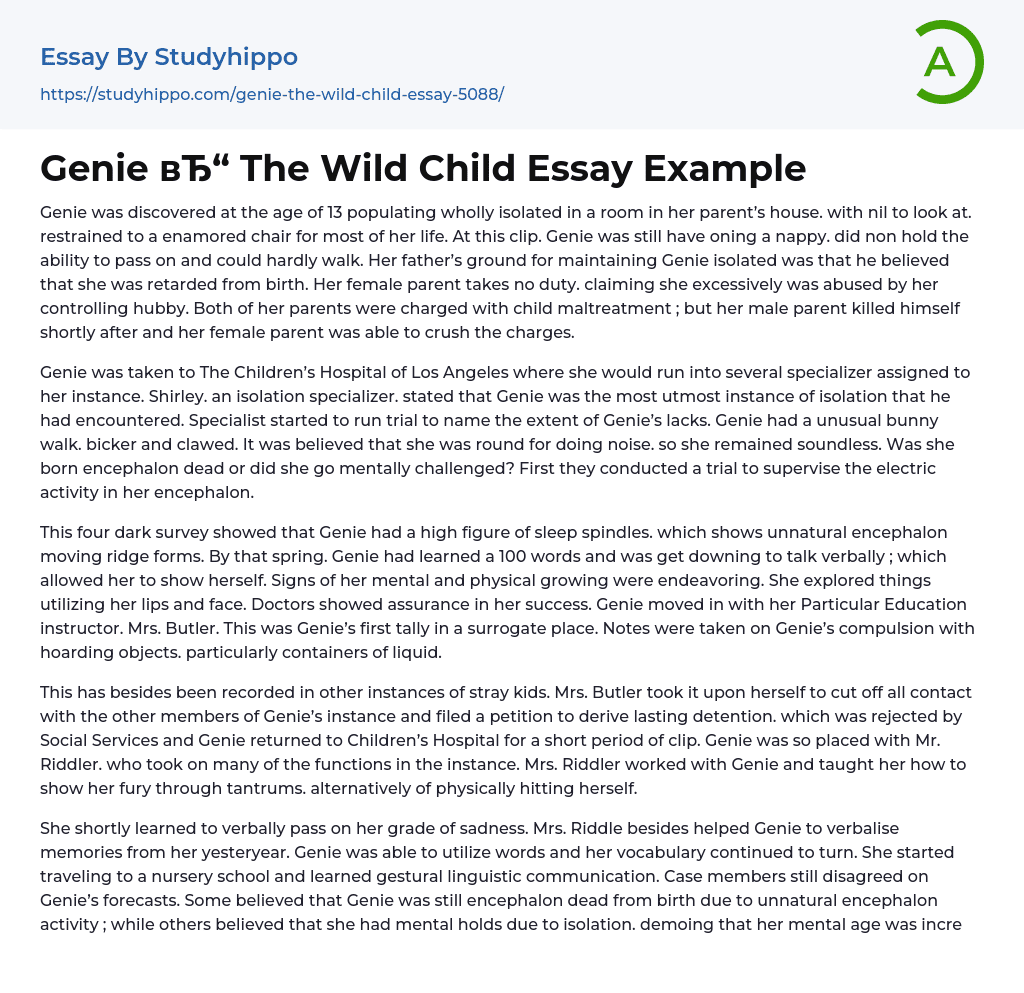Genie, who was discovered as a 13-year-old, had lived an entirely isolated life in a room at her parents' house. She had no visual stimulation and was confined to a chair for most of her existence. In addition, she still wore diapers and had limited abilities to communicate and move around. Her father believed that she was mentally disabled since birth and kept her secluded, while her mother claimed to have suffered abuse from her controlling husband but took no responsibility for Genie's situation. Both parents faced child abuse charges; however, the father ended his own life while the mother managed to avoid conviction. Subsequently, Genie received specialized care at The Children's Hospital of Los Angeles where Shirley, an expert in isolation cases, considered her case as the most extreme example she had ever encountered. Various specialists conducted tests to assess
...Genie's deficiencies and observed peculiarities in how she walked, argued, and used her hands. It became apparent that she had been punished for making noise which led to muteness being imposed upon her. Specialists debated whether she was born with severe brain damage or if it developed due to mental impairment caused by her upbringing. The initial test involved monitoring the electrical activity in Genie's brain which exhibited abnormal patterns with numerous sleep spindles. By springtime however, Genie had acquired approximately 100 words and began expressing herself verbally. Progress could be seen through signs of both mental and physical growth as she explored objects using her lips and face. Doctors remained optimistic about Genie's ongoing developmentGenie, an abandoned child, was placed in a surrogate home with her Special Education teacher, Mrs. Butler. During thi
placement, notes were taken on Genie's tendency to hoard objects, particularly containers of liquid, which is a common behavior among abandoned children.
Mrs. Butler took it upon herself to sever all contact with the other members of Genie's case and filed for permanent custody. However, Social Services rejected her petition. As a result, Genie went back to Children's Hospital temporarily before being placed with Mr. Riddler.
Mr. Riddler assumed many roles in Genie's case and worked closely with her alongside his wife, Mrs. Riddle. They taught Genie to express her anger through tantrums instead of physically harming herself and helped her vocalize memories from her past.
As Genie attended nursery school and learned sign language, her vocabulary continued to expand. Despite differing opinions among case members about Genie's prognosis - some attributing severe brain damage from birth while others pointing towards isolation-induced mental delays - she exhibited impressive verbal skills albeit struggling with grammatically correct sentences.
In 1975, the research study on Genie concluded and she returned to the care of her mother once again.Genie's challenging upbringing led to frequent changes in foster families, exposing her to abuse and torment. An incident involving punishment for vomiting caused Genie to refuse opening her mouth, resulting in a setback in her progress. Nevertheless, Genie's case strongly supports the nurture argument as she managed to overcome her early environment by experiencing the world and forming personal relationships.
Remarkably, Genie's ability to learn how to speak even after adolescence showcases that human development extends beyond infancy and can be acquired at any stage of life. By establishing personal connections, Genie acquired skills to express various emotions like happiness, sadness, and anger. This highlights the
significant role of one's environment in their overall development.
This study aligns seamlessly with Skinner's Behavior Theory which suggests that an individual's development is influenced by the consequences of their actions. For instance, when encouraged positively to communicate and socialize, Genie engaged eagerly and found enjoyment in it. However, when punished for vomiting, she associated opening her mouth with negativity and consequently refrained from doing so.Skinner's emphasis on the nurture side of the argument is exemplified by Genie's case, which suggests that experiences play a crucial role in development and individuals are molded by their environment.
- Abuse Support essays
- Child Abuse essays
- Alcohol Abuse essays
- Physical Abuse essays
- Sexual Abuse essays
- Substance Abuse essays
- Individual essays
- Infant essays
- Childhood essays
- Adolescence essays
- Growth Mindset essays
- Is Google Making Us Stupid essays
- Childhood Memory essays
- Abortion essays
- Abuse essays
- Animal Rights essays
- Animal Testing essays
- Assault essays
- Bullying essays
- Controversial Issue essays
- Crash essays
- Cyber Bullying essays
- Feminism essays
- Human Rights essays
- Immigration essays
- Inequality essays
- Poverty essays
- Prejudice essays
- Racism essays
- Torture essays
- Violence essays
- Child essays
- Child labor essays
- Childcare essays
- Abnormal Psychology essays
- Abraham Maslow essays
- Attachment Theory essays
- Authority essays
- Behaviorism essays
- Classical Conditioning essays
- Cognitive Psychology essays
- Counseling essays
- Developmental Psychology essays
- Educational Psychology essays
- Erik Erikson essays
- Family Therapy essays
- Jean Piaget essays
- Maslow's Hierarchy Of Needs essays
- Mental Health essays
- Operant Conditioning essays




